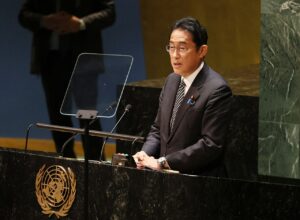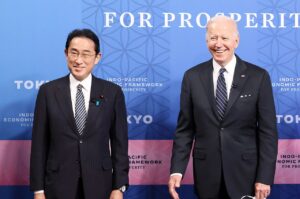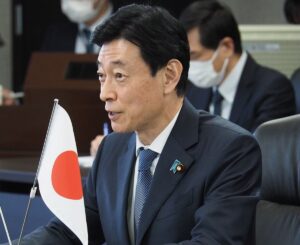Preface
It is my pleasure to present the latest publication from the Stimson Center’s Japan Program. Japan-Taiwan Relations: Opportunities and Challenges is the eighth volume of Views from the Next Generation, an annual collection of policy briefs that offer recommendations for the most significant challenges facing Japan and its partners today. In this volume, articles by four Japanese authors examine the current state of Japan-Taiwan relations and look for creative ways to bring these partners closer together.
The authors each explore complexities and limitations of the Japan-Taiwan relationship, focusing on pressing issues such as economic and security cooperation, technological advancements, cybersecurity vulnerabilities, COVID-19, and crisis-related preparedness. The two partners have a strong relationship built on shared values and affinity and so the authors emphasize bilateral cooperation and offer practical recommendations for policymakers in Japan and Taiwan. At a time when transnational challenges are becoming more severe, deepening cooperation and integrating Taiwan into international solutions is ever more important. This volume is an important contribution to the public conversation on Japan-Taiwan relations and efforts to strengthen their partnership.
Once again, I am thankful to Yuki Tatsumi for leading this project as a cornerstone of Stimson’s work on Japan. Yuki’s insights and analysis on Japan’s international cooperation have steered this series for eight years, demonstrating her dedication to facilitating a valuable discussion across the Pacific. Finally, I am grateful for the continued support and guidance from our friends at the Embassy of Japan.
Brian Finlay
President and CEO
The Stimson Center
Introduction
Pamela Kennedy and Darlene Onuorah
Japan and Taiwan, celebrating their warm relations in the lead-up to the tenth anniversary of the Great Eastern Japan Earthquake, highlighted their friendship by illuminating Tokyo Tower and Taipei 101 in January 2021. President Tsai Ing-wen of Taiwan, giving remarks via video at an event on January 23, said, “We want the world to know that we have long been good neighbors with close ties. … The warm personal ties between people in Taiwan and Japan have fostered a deep bond between us. This is called kizuna in Japanese, and it is the major driver of Taiwan-Japan relations.” 1presidential office. “20210123 總統參加「台日友情101點燈活動」” 20210123 President participates in “Taiwan-Japan friendship 101 light-up event”]. YouTube video. 1:55. January 23, 2021. https://www.youtube.com/watch?v=EEzND6cViXw.
In addition to the positive impressions the people of Taiwan and Japan have of each other, the ties between the two are also built on decades of practical cooperation, shared values, and mutual security interests. Though the unofficial nature of the relationship presents a challenge at the political level, as Japan officially recognizes the People’s Republic of China but does not have diplomatic relations with Taiwan, there is still strong cooperation across multiple policy areas – cooperation that, in fact, has grown over the years through efforts to find creative avenues for engagement. The cooperation may be unofficial, but it has been effective in working towards several important tasks: raising Taiwan’s international profile and integrating Taiwan into the international community, demonstrating the benefits of deepening cooperation for both partners, as well as sharing expertise and assistance on critical traditional and nontraditional security concerns. Also important is the goodwill between two key partners of the United States in East Asia.
One of the main platforms for Japan-Taiwan cooperation, the Global Cooperation and Training Framework, is increasingly known for its flexibility and pragmatic approach to connecting experts from Taiwan, the United States, and Japan – a full partner in the program since 2019 – with counterparts from other countries. The broad range of the initiative’s workshops in 2021, from public health to renewable energy among others, shows the variety of areas where cooperation between Taiwan and Japan is relevant beyond the bilateral, or trilateral, relationship. 2Emerson Lim. “Taiwan, U.S., Japan announce priority areas of cooperation for 2021.” Focus Taiwan. December 15, 2020. https://focustaiwan.tw/politics/2 2012150023. Especially at a time when Taiwan’s efforts to participate in and contribute to pressing international issues, like the coronavirus pandemic, are hindered by objections from Beijing, Japan’s support for Taiwan’s presence in the international community is important. This includes supporting Taiwan’s bid for World Health Assembly observer status, as well as recognizing Taiwan’s own steps to participate, such as through face mask aid packages.
Likewise, cooperation with Taiwan brings significant benefits for Japan. Taiwan faces many of the same challenges as Japan, from supply chain resiliency to disinformation to public health, and through its own experiences Taiwan has expertise to share with Japan, and vice versa. This is especially true in areas where the two democracies have similar conundrums, such as how to combat disinformation without stifling freedom of expression, or how to craft pandemic policies that save lives without restricting movement and privacy. In addition, as islands accustomed to natural disasters, Japan and Taiwan can also pool their knowledge on disaster preparedness and relief.
The United States looms large among both Taiwan and Japan’s international partners, as an unofficial partner of Taiwan and as an ally of Japan. U.S. partnership might seem to overshadow the Taiwan-Japan relationship in terms of the number of bilateral activities or cooperative measures, but the United States can also be seen as enhancing this relationship, serving as a useful third partner that benefits from Japan and Taiwan’s friendship and close cooperation. The United States often has a role to play in areas where Taiwan and Japan cooperate, such as the Global Cooperation and Training Framework. By encouraging and facilitating Japan-Taiwan relations, the United States supports the strengthening of a bilateral relationship that in turn promotes shared values and interests in the region.
Despite the strength of the Taiwan-Japan relationship, there is always room for further creative cooperation and deepening of ties to face new and ongoing challenges. In this volume, Stimson’s Japan Program has sought out the voices of rising stars in Japanese scholarship to explore the current state of Japan-Taiwan relations and make recommendations for further developing the cooperative relationship in four areas: the unofficial relationship in general, public health, disinformation, and the digital economy. By examining these shared challenges from a Japanese perspective, the four authors find many ways in which Japan and Taiwan can support and progress their ties.
In “Recent Developments in Japan-Taiwan Relations,” Dr. Madoka Fukuda (Professor, Department of Global Politics, Hosei University) surveys the historical relationship between Japan and Taiwan since 1972, the foundation of the close economic and cultural exchange today, and the impact of recent developments, particularly the pandemic, on the relationship. Highlighting several unstable factors in Japan-Taiwan relations, Fukuda examines the challenges of balancing Japan’s China policy in the context of relations with Taiwan, as well as impediments to broader economic cooperation such as a bilateral trade agreement. In her recommendations, Fukuda urges Japan and Taiwan to clarify their priorities in trade talks to move towards a consensus on the importance of a trade deal, and to find ways to cooperate to deter Chinese provocations in the East and South China Seas.
In “Japan-Taiwan Cooperation for Facilitating Future Public Health Preparedness,” Dr. Kayo Takuma (Professor, Graduate School of Law and Politics, Tokyo Metropolitan University) examines how the COVID-19 pandemic has necessitated Japan’s cooperation with Taiwan on future preparedness. Discussing the challenges of weakened U.S. global leadership, tensions with China, and Taiwan’s isolation from the international community, Takuma asserts that Japan should establish a cooperative system with Taiwan to help strengthen bilateral, regional, and global solidarity. Taiwan’s success in appropriately responding to the pandemic, and its health aid contributions to struggling countries, emphasizes its importance within the global cooperative system. Takuma offers recommendations such as the exchange of Japanese and Taiwanese medical researchers, as well as the establishment of an information-sharing and early-alert system to boost cooperative preparedness for the future.
In “Japan-Taiwan Cooperation against Disinformation in the Digital Age,” Takahisa Kawaguchi (Principle Researcher, Tokio Marine and Nichido Risk Consulting Co.) explores ways in which Japan and Taiwan can counter the cybersecurity risks that they face within the realm of disinformation. In order to protect against influence operations targeted at national elections, government entities, private messaging and social media platforms, as well as the general public, Kawaguchi assesses the vulnerabilities of both Japan and Taiwan in accurately responding to foreign and domestic state actors. Through bilateral and multilateral recommendations, Kawaguchi emphasizes the need to build coalitions with other like-minded democracies, identify and consider different adversarial forms of disinformation, and overall increase society’s resilience against unreliable information.
In “Japan-Taiwan Cooperation Towards an Open, Interoperable, Reliable, and Secure Digital Economy,” Yuka Koshino (Research Fellow for Japanese Defense and Security Policy, International Institute of Strategy Studies) assesses the current state of cooperation on digital technologies, services, and governance. Situating the discussion amid the larger context of U.S.-China strategic competition and the impact of China’s domestic digital economic developments, Koshino explores the policies that Tokyo and Taipei have pursued to ensure security of the digital economy, build and strengthen its rules and norms, and cooperate with international partners in this burgeoning economy. Her recommendations stress the demand and the need for closer cooperation to ensure resiliency of Japan and Taiwan’s networks, joint R&D projects, stemming the outflow of technology and talent to China, and helping Taiwan participate in multilateral institutions.
With these four articles, we hope that readers will take away a deeper understanding of the nature of kizuna between Taiwan and Japan, how this unique relationship thrives on both sides with a determination to support each other, share experience, and find policy solutions for mutual concerns and challenges.
About the Experts
Madoka Fukuda, Ph.D., is a professor of international politics and China studies at the Department of Global Politics, Faculty of Law, Hosei University. She received her Ph.D. and M.A. in media and governance from Keio University. Previously, she studied at the doctoral course of Graduate Institute of East Asian Studies, National Cheng-Chi University as a Taiwan scholarship student. She specializes in the PRC’s diplomacy and cross-Strait relations in the postwar years. She published her first book The PRC’s Diplomacy and Taiwan: The Origin of the ‘One-China’ Principle (Keio University Press, 2013), and received the 25th special prize for Asia-Pacific studies (The Asian Affairs Research Council, Japan). She has also published a number of peer-reviewed articles along with research for on cross-Strait relations. Her article “The normalization of Sino-French diplomatic relations and the formation of ‘One-China’ principle” (Vol. 163 of the Journal of Japan Association of International Relations [JAIR]) was awarded the JAIR academic prize for an excellent article by a young scholar in 2011.
Takahisa Kawaguchi is Principle Researcher at Tokio Marine & Nichido Risk Consulting Co., Ltd. He is interested in the impact of the information revolution on international relations, emerging technologies, and foreign election interference in cyberspace. He authored “Japan’s Defense Policy in Cyberspace,” in Yuki Tatsumi & Pamela Kennedy, eds., Key Challenges in Japan’s Defense Policy (Washington, D.C.: Stimson Center, 2020), “Cyber War” in Rebuild Japan Initiative Foundation, eds., Contemporary Geopolitics in Japan (Tokyo: Chuokoron-Shinsha Inc, 2017, in Japanese), and Contemporary Election Interference and Our Preparedness in Japan: The Impact of Cyber Attacks and Influence Operations on Social Network (with Motohiro Tsuchiya, Tokyo: Tokio Marine & Nichido Risk Consulting, 2019, in Japanese). He earned his M.A. in media and governance from the Graduate School of Media and Governance at Keio University.
Yuka Koshino is a Research Fellow conducting independent research on Japanese security and defense policy with the International Institute of Strategic Studies (IISS) Japan Chair Programme. Prior to joining the IISS, Yuka served as a research associate with the Japan Chair at the Center for Strategic and International Studies, where she managed projects and provided independent analysis on U.S.–Japan relations and U.S. strategy in the Indo-Pacific region. She also has experience providing policy and business analysis on Asia’s high-tech and defense industries at the Avascent Group and the Asia Group in Washington, DC. She previously reported and published news stories on Japanese political, economic and business affairs at the Tokyo bureaus of the Wall Street Journal, the Economist and the Japan Times. She holds a Master’s in Asian Studies from the Edmund A. Walsh School of Foreign Service at Georgetown University and a B.A. in law from Keio University, where she completed an academic year at the University of California, Berkeley.
Kayo Takuma, Ph.D., is a professor of international politics at the Faculty of Law and Politics, Tokyo Metropolitan University. Her research interest is global health governance’s origin, evolution, and challenges, with a focus on its relationship with the changing international political order. In this regard, she has been engaged in several projects, such as a comparative study on G7 countries’ contribution to the implementation of the International Health Regulations and health cooperation in Asia. She received an M.A. and Ph.D. from University of Tokyo. Her major publications are Kayo Yasuda, Kokusai Seiji no nakano kokusai hoken jigyō [International Health Work in International Politics: From the League of Nations Health Organization to the WHO and UNICEF], Minerva Shobō, 2014; Kayo Takuma, Jinrui to Yamai: Kokusai Seiji Kara Miru Kansen Sho to Kenko Kakusa [Mankind and Diseases: Infectious Diseases and Health Inequality in International Politics], Chuokoron Shinsha, 2020; and Kayo Takuma, ‘Global Solidarity is Necessary to End the COVID-19 Pandemic,’ Asia Pacific Review, 27-2 (2020), pp.46-56.
Yuki Tatsumi is the Director of the Japan Program and Co-Director of the East Asia Program at the Stimson Center. Previously, she was a Research Associate at the Center for Strategic and International Studies and the Special Assistant for Political Affairs at the Embassy of Japan in Washington. She is the author of numerous books, monographs, and articles on the Japanese defense establishment, the U.S.-Japan alliance, and security dynamics and challenges in Northeast Asia. In September 2006, she testified before the House Committee on International Relations, and she is a recipient of the 2009 Yasuhiro Nakasone Incentive Award. In 2012 she was awarded the Letter of Appreciation from the Ministry of National Policy of Japan for her contribution in advancing mutual understanding between the United States and Japan. A native of Tokyo, she holds a B.A. in liberal arts from the International Christian University in Tokyo, Japan and an M.A. in international economics and Asian studies from the Johns Hopkins University School of Advanced International Studies.
Pamela Kennedy is a Research Analyst with the East Asia Program at Stimson. Her research interests include Northeast Asian international relations, U.S. alliances in Asia, and the role of the U.S. in the Indo-Pacific region. She holds an M.A. in International Relations and International Economics from the Johns Hopkins University School of Advanced International Studies and a B.A. summa cum laude in Government and East Asian Studies from the College of William and Mary. Prior to joining Stimson, she interned with the Center for Strategic and International Studies’ Japan Chair and the Reischauer Center for East Asian Studies. She previously worked at the Federal Reserve Bank of San Francisco.
Darlene Onuorah is a Research Intern with the East Asia Program at Stimson. Her research interests include U.S.-Japan relations, Japanese defense policy, as well as East Asian political and security affairs. She will receive her M.A. in International Affairs with a concentration in U.S. foreign policy from the George Washington University’s Elliott School of International Affairs in 2021.
About Views from the Next Generation
Views from the Next Generation is a series of policy papers by emerging experts on the most pressing security challenges facing Japan and the Indo-Pacific region. Published annually since 2014 by the Stimson Center’s Japan Program with support from Japan’s Ministry of Foreign Affairs, the series raises awareness in the U.S. of issues ranging from peacekeeping to nuclear weapons – all from the perspective of the next generation of scholars and researchers – through public seminars and free distribution of the report. With each group of authors who visit Washington, D.C. for the report launch, ties between the American and Japanese security policy communities deepen.
Past volumes of Views from the Next Generation:
- Key Challenges in Japan’s Defense Policy (2020)
- International Disaster Response: Rebuilding the Quad? (2019)
- Balancing Between Nuclear Deterrence and Disarmament (2018)
- Peacebuilding and Japan (2017)
- Japan as a Peace Enabler (2016)
- Japan’s Global Diplomacy (2015)
- Japan’s Foreign Policy Challenges in East Asia (2014)
Notes
- 1presidential office. “20210123 總統參加「台日友情101點燈活動」” 20210123 President participates in “Taiwan-Japan friendship 101 light-up event”]. YouTube video. 1:55. January 23, 2021. https://www.youtube.com/watch?v=EEzND6cViXw.
- 2Emerson Lim. “Taiwan, U.S., Japan announce priority areas of cooperation for 2021.” Focus Taiwan. December 15, 2020. https://focustaiwan.tw/politics/2 2012150023.




